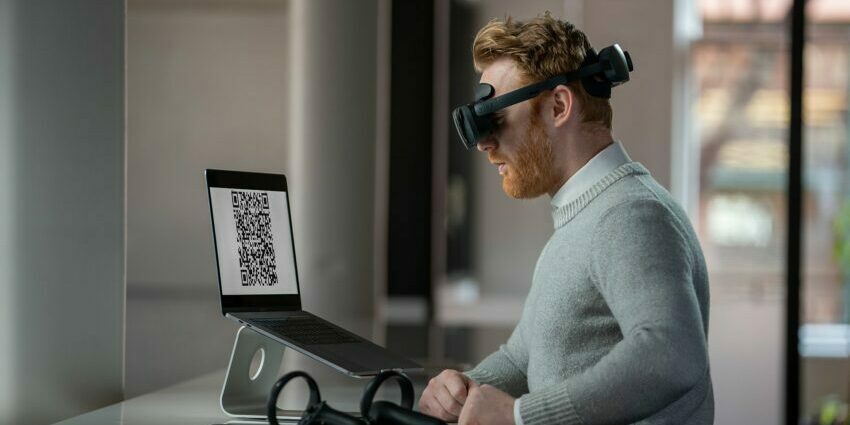Tech companies from around the world such as HTC VIVE have been working to create an ecosystem of hardware, software, and solutions capable of solving real-world challenges.
With recent updates to its hardware lineup, including the VIVE XR Elite mixed reality (MR) headset and VIVE Flow compact VR goggles, HTC VIVE has aimed to carve its niche in the global immersive tech market.
Doing so has led to a host of use cases to demonstrate the real-world value and utility of extended reality (XR) solutions. The Taoyuan City-based firm has also joined major organisations such as the XR Association and Metaverse Standards Forum to build interoperability and standards for the rising industry.
John Dabill, Director of Product Operations, HTC VIVE, discussed with XR Today developments on the VIVERSE and specific use cases for the immersive collaboration platform.
Open Ecosystem, Cross-Platform Virtual Worlds
Speaking on the VIVERSE, Dabill said that his company’s platform represented an “open ecosystem that was cross-platform.” People using the VIVERSE can attend immersive spaces via their VR headsets, PCs, smartphones, and other devices.
Dabill told XR Today that his company explored the limitations and possibilities of metaverse solutions after speaking with companies. According to him, many businesses did not initially understand how they could utilise them and required “a lot of support to create these immersive spaces.”
He explained,
“We came up with the concept of the VIVERSE for business, which has greatly sped up deployment. As a business, you can quickly receive a customised, branded environment designed to suit your needs. They can set this up in six to ten weeks, rather than building a bespoke design from the ground up”
Despite companies returning to the office, global businesses operating on multiple sites could not meet without incurring significant costs due to travel, accommodation, and other factors, Dabill explained.
He continued that HTC VIVE’s immersive spaces platform allowed people to import their product models to showcase to people across the world.
They could do so “without travelling” and by accessing a VR headset or PC to “view the 3D models in detail.” Users could do so, whether for design processes or training marketing teams for new product launches, prior to taking them to market, Dabill said.
“These virtual spaces are really becoming an extension of the physical working spaces that we have today,” he added.
HTC VIVE XR Elite: Where Form Meets Functionality
When asked how the HTC VIVE’s XR Elite form factor and functionality could attract people to adopt metaverse solutions like VIVERSE, Dabill said that hardware was “really important.”
Such immersive devices were enablers, and with better and smaller hardware, companies could “remove what’s typically been friction points in the industry.”
Dabill added that HTC VIVE had made the XR Elite “flexible for users so they can use it as an all-in-one device.” Additional features such as its rear-mounted battery pack provided wearers with additional comfort and longer battery lives.
However, those wearing special headdresses or specific hairstyles could remove the battery to wear the device in ‘Glasses Mode,’ requiring tethering to PCs or bespoke power banks.
Numerous innovations with the device “removed some of those friction and pain points that have always existed,” he said. For HTC VIVE, comfort, visual fidelity, and a long-lasting battery were the most important things needed to access immersive environments, Dabill added.
“That hardware is really enabling users to spend more time in these spaces and do more within them as well,” he added.
Takeaways from the Enterprise Metaverse Summit
When asked about his top takeaway from the Enterprise Metaverse Summit, Dabill stated it was “powerful” to see real-world use cases that were “making a difference.”
Citing a recent session with renowned doctors from Great Ormond Street Hospital, where they separated Turkish conjoined twins using VR training from the Gemini Untwined project.
Dabill concluded,
“10 to 15 years ago, [the doctor] thought that VR was a toy for people with too much time on their hands. Now he’s using that on his daily basis to make a fantastic difference to people’s lives, and it’s really nice to see that firsthand to speak to the people that are actually using the hardware and the technology to achieve those great things. So it just really motivates us to continue doing what we’re doing”
The Enterprise Metaverse Summit 2023 is concluding on its second day at the Hilton Bankside London. More than 300 attendees, 100 speakers, and 60 breakaway sessions have taken place at the landmark event.
Economist Impact hosted the two-day event, which showcased numerous topics on digital twins, the enterprise and industrial metaverse, immersive collaboration, and many more.
Tech companies such as Meta, HTC VIVE, and Siemens teamed up with consultancy firms PriceWaterhouseCooper (PwC) and Deloitte to join and deliver keynote speeches at the Summit.
For more info, kindly view the Enterprise Metaverse Summit’s website.







